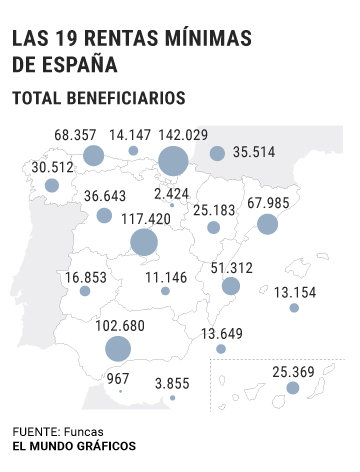It is not the same to be poor in the Valencian Community as in the Basque Country. And it is not the same to be a long-term unemployed in Navarra than in Extremadura.
All the autonomous communities guarantee a minimum income to fight against poverty and favor labor inclusion. Since the crisis, these rents are the livelihoods of many Spanish families. The number of citizens who have been granted one of these benefits has tripled since 2007 [has increased from 103,071 to 313,291 in 2017] and, if the people who depend on the owners of these income are taken into account, the number of Spaniards who live thanks to them amounts to 780,000.
But these minimum incomes are not the same in all Autonomous Communities, nor are the requirements to access them or their compatibility with other types of aid. This is reflected by Funcas, the Foundation of Savings Banks, in its Social Panorama magazine , released yesterday. It portrays the great territorial fragmentation of this system, which has 19 different regulations -17 communities and two autonomous cities- to fight against poverty and social exclusion. They are not even called equal from one community to another.
Funcas estimates that the minimum income charged in Spain, on average, is around 450 euros. However, the beneficiaries of this benefit in the Basque Country - the Autonomous Community with the highest economic endowment, 672.7 euros - will be entitled to almost 300 euros more than the citizens of the Valencian Community, the most modest, with 388 euros.
But the differences go much further. There are two types of benefits depending on their internal composition: the simple ones - such as those granted in Asturias or Madrid -, which include an economic benefit depending on the number of people living together, and the complex ones - such as the Catalan one -, that depending on the size of the family adds a complementary income of activation and insertion.
Even the way to calculate the amounts is not homogeneous in this autonomous amalgam: thus, some Autonomous Communities choose to calculate their income based on a percentage of the Minimum Interprofessional Salary (SMI) -PSOE and we can agree to raise it to 900 euros in 2019- (it is the case of the Basque Country , Valencian Community or Castilla-La Mancha ) and others take as reference the IPREM, the public indicator of multi-effect income ( Castilla y León, Cantabria , La Rioja and Andalucía ). But there are more differences: in Navarra and Aragon , for example, there are fixed amounts, and Catalonia has developed its own Sufficiency Income Indicator (the IRSC).
"Two extreme examples attract attention," Funcas' publication warns, "Navarra, which has one of the lowest population-at-risk rates in all of Spain, has the most generous guaranteed income benefit, both in amount and in duration. However, the amount and the period of collection of the insertion income in Extremadura are smaller, although in this community the population at risk of poverty reaches a much higher percentage ».
Moderate efficiency in labor reintegration
The evaluation of minimum income programs, already complicated by territorial fragmentation, is hampered by the fact that most programs pursue two objectives whose achievement is not always linked, Funcas warns: reduce poverty and insertion (or reintegration) labor.
"The available evidence suggests that minimum incomes, where they arrive, are effective in reducing poverty, while their efficiency costs in the form of disincentives to employment are very moderate."
Funcas has detected a “non-majority) chronification of benefits in some particularly vulnerable households” and with a low capacity for labor insertion. This timing coexists with the high turnover of these benefits.
According to the criteria of The Trust Project
Know more- Navarre
- Valencian Community
- Social helps
- Basque Country
- Madrid
Macroeconomics La Mancha, the region that takes the least time to recognize aid for the unemployed, and Madrid, the one that most
Basque Country Euskadi is the community with fewer students in public schools
According to Adecco, the average salary in Spain cuts its purchasing power by 133 euros annually since 2017

